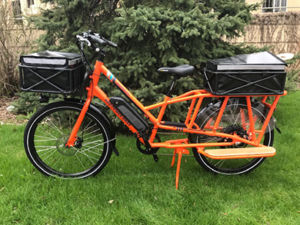Rent-a-Scooters More Popular Than Free Bikes in Rochester Trial Run
Somewhere along the line providing bicycles to the public evidently became an essential city service. What better vehicle for politicians to display their allegiance to carbon neutrality and healthy urban lifestyles.
Rochester made nearly 50 bikes and helmets available to the riding public, free at least to the users, in 2019. The city website highlights the Bike Share Program program as part of the “micro-mobility initiative” associated with the $5.6 billion Destination Medical Center project’s transit plan.
The city even furnishes free use of electric bikes for checkout at the library to “ideally replace a few car trips around town.” The program led to the city’s bikes being checked out 1,234 times between May and November.
NEW this year, the Bike Share Program is proud to offer an electric cargo bike available for public use at no cost. The electric cargo bike is only available at the Rochester Public Library. This electric-assist Radpower Cargo bike has additional baskets and bags available for folks that are looking to run some errands and as a result will be carrying some extra cargo.
But for the first time last year Rochester also approved a trial run of Lime electric scooters. Riders pick up and drop off the rent-a-scooters at their whim at a cost of $1 to unlock the unit and 29 cents a minute to operate it.
Despite the cost differential, the usage of rent-a-scooters quickly sped by the ridership totals for the city’s freebie bikes, according to final numbers released in the Rochester Post-Bulletin.
…More than 200 motorized rental scooters were on the street, according to Jaymi Wilson, a project manager for Rochester’s city administration. The average trip was less than a mile long.
The Lime scooters covered 63,078 miles during a 15-week trial, with 12,853 riders logging 50,641 trips. At the peak, nearly 6,000 trips were made in a week, with nearly 3,000 individual riders paying the fees for the two-wheeled devices.
Rochester officials say the shared scooters complement rather than compete with the shared bike program. At the same time the city council plans to review e-scooter regulations.
“There’s going to be stuff we need to change, no matter what,” Council Member Nick Campion noted, suggesting staff present the council with an ordinance proposal at a later meeting.
Among potential changes are limiting operation hours, requiring a rental company to have an operating agreement with the city, and creating designated parking corrals for scooters.